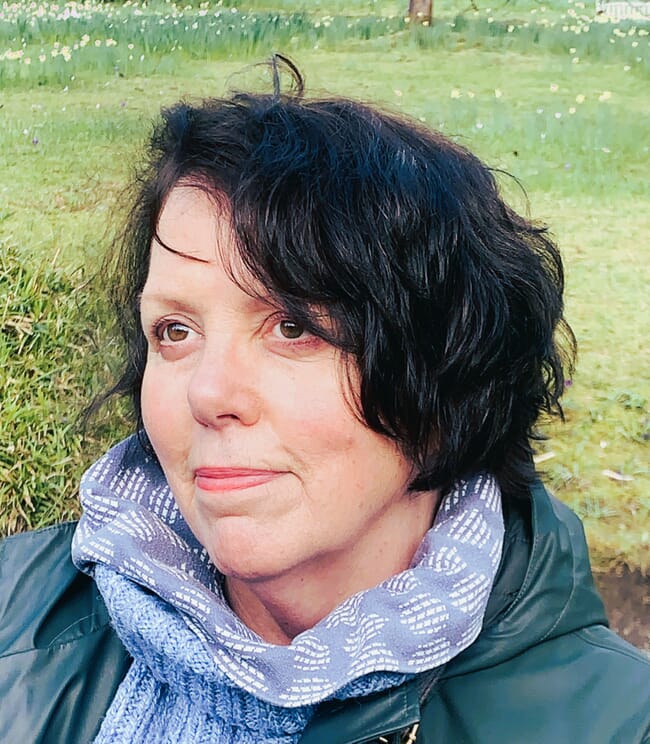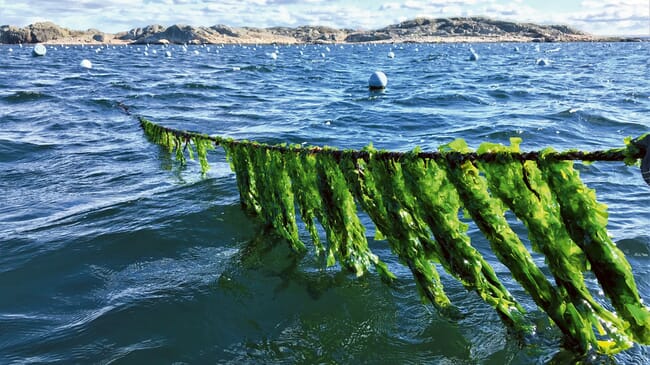
It is traditionally made from Porphyra umbilicalis
Co-project lead, Fiona Trappe, explains her commitment to seaweed – as a means to improve ocean and planetary health, as well as create opportunities in coastal communities.
Can you tell me a bit about your background, The Seaweed Alliance and your role in it?
I co-founded The Seaweed Alliance (a not-for-profit) in 2017 together with my colleague Charles Blair as a means of raising awareness, sharing information and coalescing interest in the key role our ocean plays in climate change mitigation.
What inspired you to embark on Project Madoc?
Project Madoc* represents a logical progression from the early work we were doing to advance seaweed’s cause as a natural resource that grows abundantly around the shores of Wales and elsewhere in the British Isles, with the potential to be harnessed for wider economic and environmental benefit. We see the report as a catalyst to shift seaweed into the mainstream, as the basis for a new industry for Wales founded on sustainable farming, harvesting and bioprocessing.
What’s the current state of the Welsh seaweed sector and what sets it apart from other seaweed-producing nations?
To date, the only commercial-scale seaweed farming in Wales is being undertaken in Pembrokeshire, a community enterprise, Car-y-Mor. But, given the nutrient-rich seas of Wales, a coastline more than five times that of The Netherlands and Belgium combined, there is no good reason for Wales not being able to compete as a significant producer and processor in UK and European markets.

What are the main opportunities for Wales?
The report concluded that Wales should adopt a phased approach: developing capacity and incrementally increasing the volume of farmed kelp (brown species) dulse (red species) and Ulva (green species).
Seaweed contains a myriad of compounds used in industry with new applications identified almost on a daily basis! Certain compounds from seaweed can be used to displace intensive carbon-based industry applications, such as packaging and construction materials, requiring seaweed to be farmed at scale.
Given that offshore renewables is a key sector in Wales, there is huge potential to co-locate and make effective use of the under-utilised space that surrounds offshore wind turbines.
Innovation and technology – including automated harvesting, remote monitoring and the application of AI – have exploded over recent years, providing systems suitable for farms of varying scale, location and species. These can increase yields while reducing costs, so can make Welsh seaweed more competitive. At the same time, there may be scope for land-based production (in tanks) for certain higher value species, like dulse.
As production capacity builds, we see numerous high value markets for traceable and premium quality Welsh seaweed. These will include MedTech, pharma, dietary supplements, nutraceuticals, cosmetics, biostimulants for agriculture and animal feed.
What are the biggest obstacles that need to be overcome?
Given the newness of seaweed farming it’s essential to increase the awareness that planners, policy makers and potential investors, have of the viability and sustainability of an industry based on farming seaweed in Welsh waters.
In common with other parts of the UK, the various licences and permits required to be able to farm seaweed need to be streamlined and costs reduced to encourage new entrants.
There’s also a clear lack of experience, hence the need for knowledge/technology transfer from countries more advanced than the UK.
Investment is clearly going to be key, from a blend of private and public sources, but net zero, marine net gain and carbon credits, mean that ethnical investors are looking for good projects to back.
It is important that any interested developers engage with local communities, explain the steps needed to developing a seaweed industry, and the benefits in terms of jobs and environmental services. Several planned seaweed farms in Cornwall have been stymied as the result of public objection on various grounds, mostly relating to access.
Were you particularly surprised by anything that you discovered?
Having our ears very close to the ground for the last six or more years, we are pretty well tuned-in to what’s happening across the seaweed world. However, in the course of researching the project we were struck by the evident goodwill from stakeholders towards seaweed. This needs to nurtured to avoid situations like those mentioned above in Cornwall.
The pivotal role our seas and oceans play in climate change mitigation and seaweeds’ contribution in this, isn’t as widely appreciated or understood as it ought to be. There is a myriad of ocean-based innovations that currently fall under the radar that require investment to advance and deploy. Hence why we strongly advocate that seaweed needs to be considered in the context of accelerating development of a new wider new blue economy.

Trappe believes Wales is well suited to its production © Nordic Seafarm
What message would you give to anyone considering getting involved in the Welsh seaweed sector?
There’s no single pathway to getting into the seaweed industry, not least because it has – or will have – a long value-chain once better established. Deciding where – and then how – they want to enter this chain is a good starting point. Experience shows – as in the case of The Cornish Seaweed Co – this can often be a progression, from foraging to sustainable wild harvesting (and selling to local restaurants) and building from there.
Some of those already living and working around the coast will have the knowledge, experience and equipment that could supplement their income from seaweed. Fishermen, for example tend to have well developed seamanship skills and can get started by safely wild harvesting seaweed then transitioning to small-scale farming. Or a terrestrial farmer near the coast might look to seaweed farming and processing as a form of diversification – potentially seeing an opportunity to supplement their animal feed or convert seaweed and other organic materials into biochar (through pyrolysis) to lock in the carbon.
In terms of helping to regenerate coastal communities, often marginalised through the decline of traditional industries, seaweed farming and processing could be a welcome adjunct for Welsh-speaking communities as sources of opportunities for social enterprises. The advocates for seaweed are all too willing to help and support each other. I would recommend first and foremost understanding the process involved in obtaining a marine licence. Our study concludes with a suite of recommendations including streamlining this process.
How will the report be followed up?
The report, although only released a couple of weeks ago, is already creating a groundswell of support in political circles. But it needs to be seen as the first rung in the ladder to a bigger – more ambitious – picture for Wales in the context of advancing the wider new, blue economy. This would open a plethora of opportunities for Welsh aquaculture and smart aquatech impact startups.
In order to accelerate and consolidate this development, support is going to have to be forthcoming at a political level. The report foreshadows the formulation of a Welsh Seaweed - Industry Development Plan (WS-IDP) as its logical progression.
In a wider context however, careful consideration should be given by planners and policy makers for a White Paper that points the way forward for the conditions and resources needed for a world class Welsh, new blue economy.




